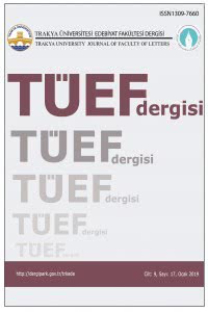CHINUA ACHEBE’NİN PARÇALANMA (THINGS FALL APART) ADLI ESERİNDE KÜLTÜREL KİMLİĞİN BOZULMASI
Yirmi birinci yüzyıl Afrika’sı uzun süren sömürgecilik tarihi ve akabindeki köklüdeğişiklikler nedeniyle çeşitli kültürden insan gruplarının ve bir çok muhalif hükümetin kıtasıolmuştur. Bu nedenle, sömürge sonrası Afrika edebiyatı hakkındaki çalışmalar, Afrika’nınsömürge geçmişini ve bir metnin arkasında yatan ideolojiyi incelenmeden tamamlanmışsayılmaz. Chinua Achebe, romanlarında metinlerin doğru bir şekilde tefsir edilmesini sağlayanve okurları tarihsel ve kültürel bakış açılarıyla kavramsallaştırılmış önemli konularla tanıştıran,Afrika kültürünün en önemli yazarlarından birisidir. Onun romanları sadece Afrika tarihini vekültürünü yansıtmakla kalmayıp aynı zamanda Afrikalıları insan olmayan vahşi yaratık olarak resmeden Avrupa merkezli yazınlardan oluşan edebi kanona doğrudan bir cevapniteliğindedir. Özellikle Things Fall Apart adlı eserinde, Achebe Nijerya’nın İngilizler tarafındansömürgeleştirilmesinin ve bu sömürünün beraberinde getirdiği siyasi çalkantının resmini çizer.Bu makalenin öncelikli amacı, Achebe’nin birçok şekilde Afrika’yı güçlü bir kültürel kimliğesahip, kendi kendine yeten bir millet olarak temsil etmesi ve Afrika’nın belli bir toplumundasömürgeciliğin yol açtığı kültürel kimliğin bozulmasıyla sonuçlanan yıkıcı değişiklere ışıktutmaktır.
Anahtar Kelimeler:
sömürgecilik, sömürgecilik sonrası edebiyat, kültürel kimlik, Afrika edebiyatı, Chinua Achebe, Things Fall Apart(Parçalanma)
THE DISTORTION OF CULTURAL IDENTITY IN CHINUA ACHEBE’S THINGS FALL APART
Twenty-first century Africa is currently a continent of culturally diverse groups of people, many opposing governments, and fragmented identities due to its long history of colonization and the drastical changes following its independence. Accordingly, the study of post-colonial African literature cannot be complete without the study of Africa’s colonial past and the ideology behind a text. Chinua Achebe is one of the significant writers of African culture who in his novels aims to provide an erudite exegesis of the texts and introduce readers to important contextualizing historical and cultural perspectives it defines. His novels not only represent the history and culture of Africa, but also serve as a direct response to a whole canon of Eurocentric writings presenting Africans as inhuman savages. Particularly, in his Things Fall Apart Achebe paints a grim picture of the colonization of Nigeria by the British and the political turbulence following its colonization. The primary purpose of this paper is to shed light on Achebe’s various ways of representing the self-sufficiency of African nations with a strong sense of cultural identity, and the catastrophic changes in an African society brought along by colonialism, resulting in the distortion of its cultural identity.
Keywords:
colonialism, postcolonial literature, cultural identity, African literature, Chinua Achebe, Things Fall Apart,
___
- Achebe, Chinua, Things fall apart, New York: Anchor Books, 1994.
- Achebe, Chinua, interviewed by Jerome Brooks, “The Art of Fiction No. 139”, 1994, Retrieved 01, April 2019 from https://www.theparisreview.org/interviews/1720/chinua-achebe-the-art-offiction- no-139-chinua-achebe.
- Achebe, Chinua, “English and the African Writer”, Transition, (75/76), 1997, pp. 342-349.
- Achebe, Chinua, interviewed by Katie Bacon, “An African Voice”, Atlantic Monthly 2 Aug. 2000. Atlantic Online, Atlantic Group, 2000. 1 Jan. 2003, Retrieved from https://www.theatlantic.com/magazine/archive/2000/08/an-africanvoice/306020/.
- Achebe, Chinua, The Education of a British-Protected Child: essay, Knoph., 2009.
- Ashcroft, Bill, Griffiths, G., & Tiffin, H. Post-colonial studies: The key concepts, London: Routledge, 2000.
- Povey, John, Contremporary West African Writing in English, Books Abroad Vol: 40 Issue: 3, 1966, pp. 253-261.
- Rhoads, Diana A, “Culture in Chinua Achebe's Things Fall Apart.” African Studies Review, 36(2), 1997, pp. 61-72.
- Whittaker, David & Msiska, Mpalive. Chinua Achebe's things fall apart: A Routledge study guide, 2007, pp. xi-xii.
- ISSN: 1309-7660
- Yayın Aralığı: Yılda 2 Sayı
- Başlangıç: 2011
- Yayıncı: -
Sayıdaki Diğer Makaleler
The Shakespeare Circle: An Alternative Biography
ÇEVİRİ GÖSTERGEBİLİMİ EKSENİNDE ÖZGÜN METİN OKUMA VE ÇÖZÜMLEME MODELİ İLE ANLAM ARAYIŞI
Fast Forwarding with Audiovisual Translation
FAKRU’D-DEM TERİMİ VE KLASİK TÜRKÇE TIP METİNLERİNDEKİ EŞ ANLAMLILARI
CARLO GOLDONI VE LOKANTACI KADIN ADLI YAPITINDA TOPLUMSAL ÖGELER
EDİRNE MÜZESİ’NDEKİ BİZANS KURŞUN MÜHÜRLERİ
AÇLIK OYUNLARINI KIM OYNUYOR: ARTEMIS MI PERSEFONI MI? SUZANNE COLLINS’IN ÜÇLEMESINDE PERSEFONI MITI
